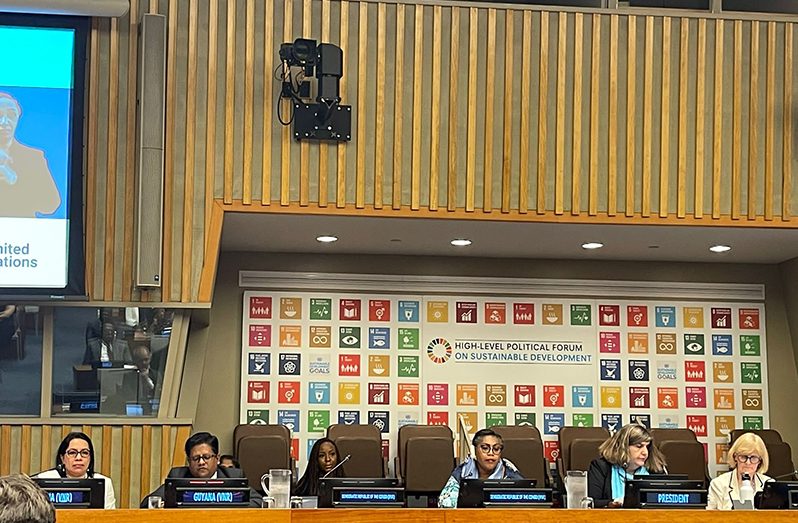–Finance Minister tells stakeholders at high-level political forum on sustainable development
–reiterates Guyana’s firm commitment to Agenda 2030
SENIOR Minister in the Office of the President with Responsibility for Finance, Dr. Ashni Singh, on Monday, reiterated Guyana’s firm commitment to Agenda 2030, while also outlining Guyana’s progress in meeting the Sustainable Development Goals (SDGs) with President, Dr. Irfaan Ali’s ‘One Guyana’ philosophy being the umbrella under which the government’s targets are set, as well as its efforts regionally and globally.
“Guyana’s President, Dr. Mohamed Irfaan Ali has committed to a philosophy of One Guyana to guide all public policy, with a firm commitment that our country’s recently enhanced economic fortunes be deployed to improve the lives of every single Guyanese.
“The One Guyana philosophy is also grounded in a recognition of Guyana’s role in regional and global outcomes. Examples include Guyana’s leadership on the Caribbean Community’s (CARICOM’s) goal of improving food security by reducing the region’s food import bill by 25 percent by 2025, as well as our Low Carbon Development Strategy 2030 which harnesses Guyana’s forests in the global fight against climate change,” Dr. Singh said during the forum at the United Nations (UN) Headquarters in New York.
He alluded to the past few years which saw countries grappling with COVID-19, increased geopolitical tensions, disruption to the global supply chain, and inflationary pressures not seen for nearly two decades.
“This was driven by rising energy and food prices, which hurt the vulnerable most. Meanwhile, the past eight years were also the warmest on record globally, as the onslaught of climate change continues unabated, while we continue to lose the battle to limit our own damage to the world which we plan to leave for our children and grandchildren.
“These realities lay bare the oneness of the planet on which we live, and the interdependence of our wellbeing. This interdependence provides the most compelling argument in favour of a shared global responsibility for eradicating poverty worldwide and reaffirms the very foundation on which the SDGs are based,” the Finance Minister said.
Dr. Singh noted, however, that Guyana will continue to work aggressively to advance its progress toward the SDGs as he referenced the country’s second Voluntary National Review.
The Senior Finance Minister indicated to the officials gathered that national commitment alone will, however, not be enough to achieve the SDGs in many of our countries, especially the poorest and most vulnerable.
It was on this note that he reminded the forum that in 1970 “our predecessors met in this very hall and resolved that the developed world should deliver official development assistance of no less that 0.7 per cent of Gross National Product by 1975.”
“Fifty years later, five advanced economies have achieved this target. The others have mostly gone quiet, while the developing world has been embarrassed into minimising mention of this missed target,” Dr. Singh said.
UNDELIVERED COMMITMENTS
He, therefore, used the opportunity at the forum to also repeat Guyana’s previous call for this and other long-standing undelivered commitments be honoured, including the adoption of a Multidimensional Vulnerability Index, while also endorsing measures such as the ones proposed under the Bridgetown Initiative to support the most vulnerable countries.
“No less is required, if we are to have even a remote chance of achieving the lofty but necessary goals we set ourselves in Agenda 2030,” Dr. Singh concluded.
The 2023 High Level Political Forum (HLPF) on Sustainable Development currently ongoing in New York is being held under the theme: “Accelerating the Recovery from the Corona Virus disease (COVID-19) and the full implementation of the 2030 Agenda for Sustainable Development at all levels.”
It is assessing comprehensively the impacts of the interlinked crises on the implementation of the 2030 Agenda and on all SDGs.
The forum is placing particular emphasis on trends and policies related to SDG 6: Clean water and sanitation, SDG 7: Affordable and clean energy, SDG 9: Industry, innovation and infrastructure, SDG 11: Sustainable cities and communities and SDG 17: Partnerships for the Goals and their interlinkages to other goals.
Participants discussed policies and transformations needed to overcome the crises, make up lost ground on the SDGs, and shift the world on a path to achieve the 2030 Agenda.
During the forum, Dr. Singh presented on Guyana’s Second Voluntary National Review of the SDGs under the theme “One Guyana: Achieving Low-Carbon, Sustainable Development for All,” reflecting on the alignment of the country’s national development strategy, the Low Carbon Development Strategy 2030, with Agenda 2030.
Minister Singh highlighted that Guyana has been making significant progress on attaining the SDGs with government working aggressively on all of the core development areas targeted.
He further said that achieving resilience and full implementation of Agenda 2030, requires immediate mobilisation and deployment of adequate levels of affordable financing, especially for the most vulnerable countries. This can only be realised with redoubled national and global commitment.
In 2015, the Sustainable Development Solutions Network (SDSN) published the first SDG Index which ranked countries regarding their initial status on the 17 SDGs. In 2023, Guyana recorded an improved score of 67.4 compared with 61.9 in 2018.
This improvement in the score facilitated upward movement in the ranking to 96 out of 166 countries in 2023 up from 104 out of 156 countries in 2018. The SDG index score signifies a country’s position between the worst (0) and best (100) outcomes and can be interpreted as the percentage of achievement.
Guyana’s overall index score of 67.4 suggests that the country is on average 67 per cent of the way to best possible outcomes across the 17 SDGs.



.jpg)









